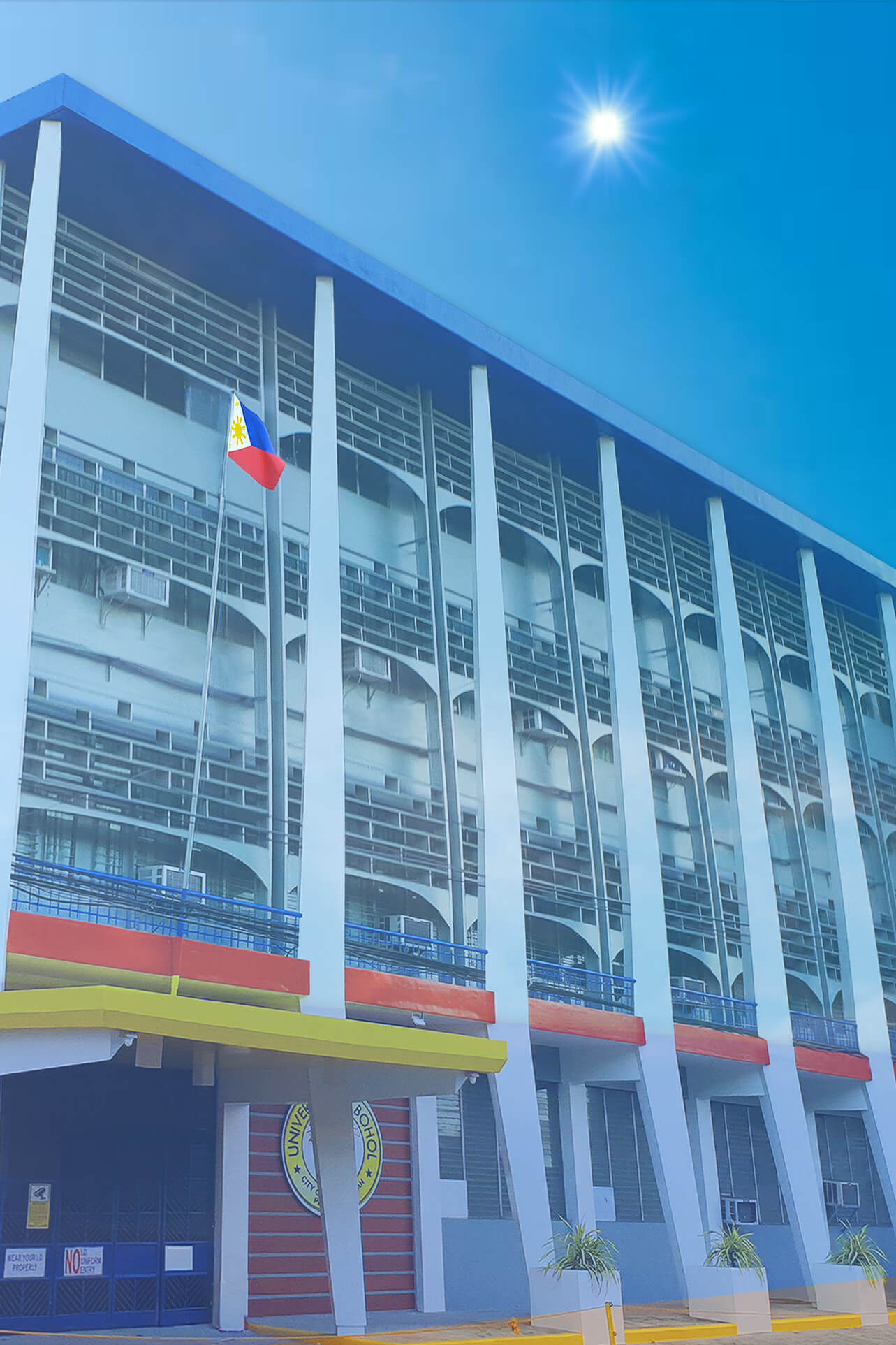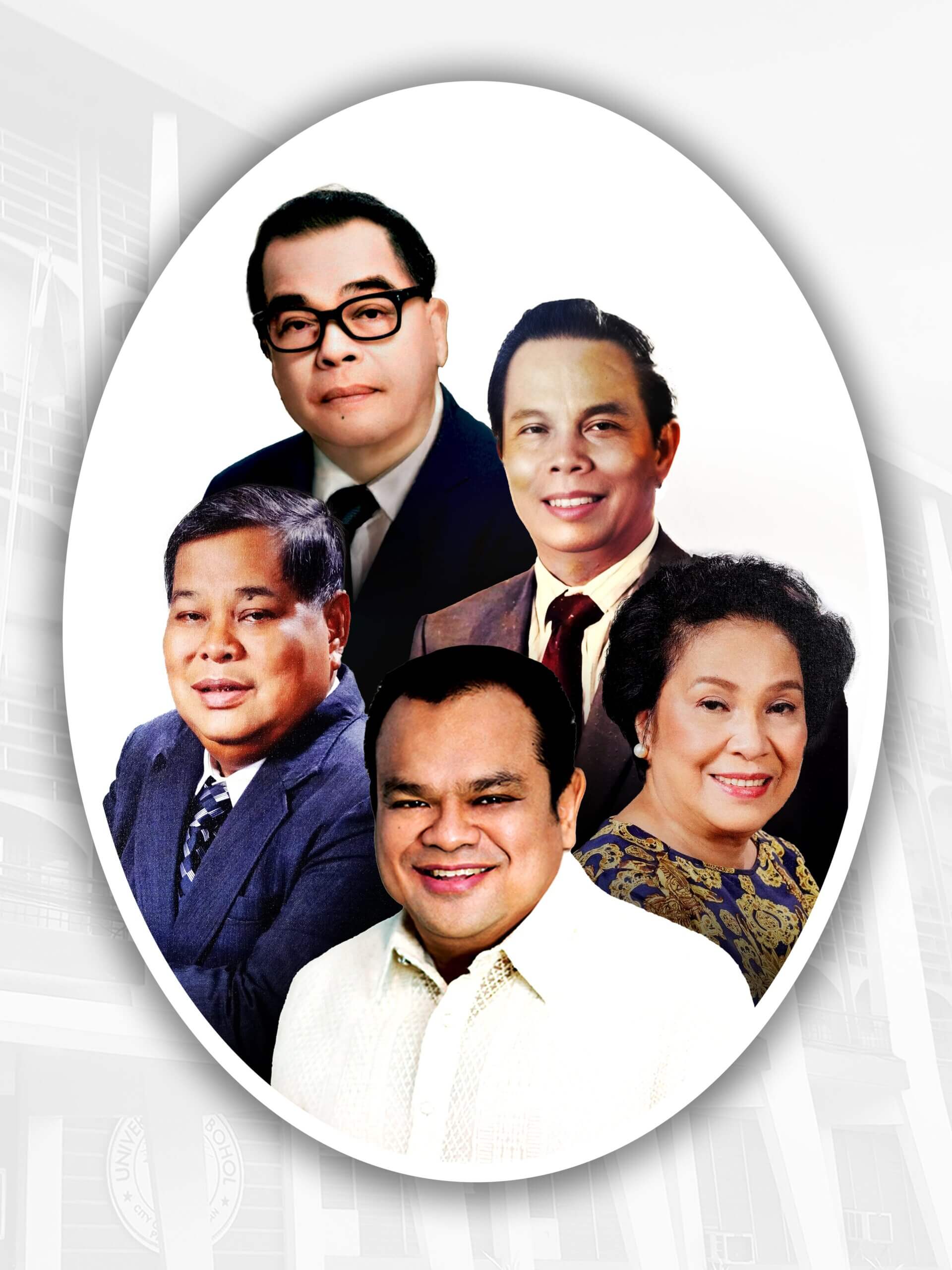From its humble beginnings to its growth and milestones. It highlights the people, events, and achievements that have shaped who we are today, serving as a testament to our legacy and commitment to the future.

The University of Bohol was originally named Rafael Palma College after the greatest scholar of his time, the late Dr. Rafael Palma. Its history is an account of how a group of public and civic-spirited citizens of the province of Bohol ventured to establish an educational institution to answer a long-felt need for college education by those who could not afford to study outside the province.
In 1946, amid the nation’s recovery from the ravages of World War II, a group of visionary and civic-minded Boholano leaders courageously laid the foundation for a local institution of higher learning. Thus, Rafael Palma College was born. The pioneering Board of Trustees consisted of Dr. Pio C. Castro, President; Mr. Mariano Rocha, Vice President; Atty. Felix Magdales, Secretary; Mr. Catalino Castillo, Treasurer; and Atty. Donato Galia, Member. Through the efforts of Atty. Victoriano D. Tirol, Sr., permits for the initial courses were secured from the Bureau of Private Schools on June 10, 1946. Soon after, the school opened its doors to 622 students, war-deprived yet determined to continue their interrupted education.
What began as a modest institution, sustained mainly by the contributions of civic-spirited Boholanos, grew steadily in both stature and service. On December 11, 1970, Atty. Victoriano D. Tirol, Sr. was installed as the first University President, a historic milestone that also marked the transformation of Rafael Palma College into the University of Bohol. The renaming was a tribute to the Boholanos’ enduring regard for education, as a priceless treasure and a lasting legacy that no adversity can ever take away.
On March 24, 1998, the University of Bohol welcomed its second president, Atty. David B. Tirol, who solemnly pledged before God and constituents to uphold the institution’s vision. Over time, in response to evolving industry demands, it broadened its academic offerings to include allied medical programs. During his tenure, the University prioritized the formal accreditation of its programs to enhance the instructional quality. Pursuant to this goal, it submitted applications for accreditation to Philippine Accrediting Association of Schools, Colleges, and Universities (PAASCU) for its core programs.
On December 11, 2010, the University of Bohol welcomed its third president, Dr. Victoriano B. Tirol, Jr., marking the beginning of a transformative era. Guided by a visionary outlook, Dr. Tirol steered the University towards a strategic path focused on advancing instruction, enhancing institutional relevance, and promoting sound financial literacy.
This period saw significant physical expansion and an increase in assets, epitomized by the construction of the state-of-the-art UB VDT-ALC campus. With an Olympic-sized swimming pool and a comprehensive Sports Complex, this development underscored the University’s commitment to growth and modernization.
On December 12, 2014, the University inaugurated its fourth president, Dr. Nuevas T. Montes, charged with navigating the institution through a period of transition. Dr. Montes spearheaded the proactive harmonization of policies and systems, bolstered academic excellence through extensive curriculum realignment and program accreditation, and prioritized sustainability by enhancing educational access for students from feeder schools. Additionally, she undertook the challenge of meeting the requirements of the K to 12 implementation and ASEAN integration preparedness.
On April 1, 2018, Dr. Victoriano B. Tirol III assumed the presidency as the fifth leader of Bohol’s oldest university. He was formally installed on December 11, 2018. Infusing the institution with a fresh perspective, his youthful energy signified a commitment to change and innovation in education. He aimed to build upon the sturdy legacy of past leaders while committing to advancing educational innovations. This aim is to ensure dynamic and progressive leadership in the field of education.
The University relentlessly pursued quality assurance initiatives, resulting in the attainment of Level III Accreditation for its core programs and accreditation for nine additional programs.

Inspired by the overwhelming desire of the Boholanos for education, the University trail-blazed the offering of more vocational, baccalaureate, graduate, and post-graduate courses. Over the years, it has produced thousands of graduates and professionals who have significantly contributed to the human resource needs of government institutions, major organizations, and industries within the province and beyond.
The University’s vision of transforming lives for a great future resonates profoundly in the stories of its alumni and their families. Today, UB graduates span the globe, thriving as accomplished professionals in diverse fields of endeavor. They are living testimonies to the truism of the mission of the university to provide a holistic education anchored on Scholarship, Character, and Service. Their success has inspired the Boholanos to replicate by sending their sons and daughters to study at the University.
In its steadfast pursuit of providing quality education, the University of Bohol has set its sights on attaining autonomous status, with a strong focus on the continued accreditation of its academic programs.
At present, the University takes pride in its PAASCU Level III accredited programs, which include: Bachelor of Science in Business Administration major in: Marketing Management, Financial management, Operations Management, and Human Resource Development Management; Bachelor of Arts Major in Political Science, Bachelor of Arts Major in Philosophy, Bachelor of Arts Major in English Language Studies; Bachelor of Elementary Education, and Bachelor of Secondary Education major in English, Filipino, Math, Physical Science, Social Studies, and Science.
Meanwhile, the following programs have been granted PAASCU Level II accreditation: Bachelor of Science in Nursing, Bachelor of Science in Hospitality Management, Bachelor of Science in Tourism Management, Bachelor of Science in Criminal Justice Education, University Grade School, Junior High School, and University of Bohol Victoriano D. Tirol Advanced Learning Center Basic Education.
For the Graduate School, the University has also achieved PACUCOA Level II accreditation for the following programs: Master of Arts in Educational Management, English, Guidance and Counseling; Psychology and History; Master of Arts in Teaching: Filipino, Mathematics, Physical Education, and Social Science; Master of Arts in Education, major in Elementary Math Teaching, Elementary Science Teaching, and Pre-Elementary Teaching; Master of Science in Business Administration, and Master in Public Administration.
Through these accreditations, the University of Bohol reaffirms its commitment to academic excellence, continuous improvement, and the fulfillment of its mission to mold competent professionals and leaders for the future.
On March 21, 2020, the University of Bohol, along with all other schools in the country, suspended classes following the national government’s lockdown declaration due to the COVID-19 pandemic. Humanity as a whole was thrown into uncertainty, and the future of education seemed unclear. Yet the University refused to be paralyzed by the crisis. Instead, it responded with resilience, finding innovative solutions to ensure that learning would continue. The call to sustain education amid the pandemic became the University’s foremost mission, resonating across the community and earning the warm recognition of its stakeholders.
By August 2020, despite the challenges, the Board of Trustees made the bold decision to open the new school year. With determination, the University introduced UBLENDED Flexible Learning Education, a hybrid approach that combined online and offline instruction.
Through this innovative learning model, UB mobilized its faculty, staff, and students to adapt to online education and operations. With perseverance, it successfully launched virtual classrooms and utilized digital platforms to deliver quality instruction.
When School Year 2021–2022 opened on August 15, 2021, the University remained steadfast in its commitment, continuing to implement the UBLENDED Flexible Learning Education program to serve the academic needs of the community in the face of ongoing challenges.
The University of Bohol now stands at 79 years of existence and 55 years as a University, a legacy marked by service, resilience, and excellence. It takes pride in its graduates who have gone the extra mile to succeed in life, Board Examination topnotchers, prominent leaders, and successful entrepreneurs whose achievements continue to bring honor to their alma mater. Their contributions, in turn, fuel the economic growth of both the province and the nation.
Equally significant is the role of UB alumni working abroad. Thousands of them, spread across different parts of the globe, faithfully send remittances to support their families and the education of younger generations. These foreign currency inflows have not only strengthened the stability of the national economy but also reinforced the University’s mission of transforming lives.
Within Tagbilaran City and its neighboring municipalities, the University has created a vibrant ripple effect on local commerce. Businesses such as boarding houses, eateries, transportation services, malls, groceries, salons, internet cafés, and other essential establishments continue to thrive, spurred by the University’s steady presence and its growing academic community. Indeed, the institution’s enduring educational services have kept the local economy dynamic and robust.
Through nearly eight decades of fruitful service, the University of Bohol has become a byword of hope and opportunity in the island province. Even before the tourism industry flourished, UB had already positioned itself as a prime economic driver of Tagbilaran City and the Province of Bohol. This vital role has been strongly acknowledged and deeply valued by the local community.
Today, as the University of Bohol looks toward another decade of service, it does so with dignity, pride, and gratitude. Having met challenges head-on and emerged triumphant, the University stands strong in faith, hope, and prayer, firm in its unwavering commitment to serve the community and to shape a brighter future for generations to come.


A premier university transforming lives for a great future. Anchored on : SCHOLARSHIP, CHARACTER, SERVICE